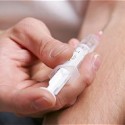What to Expect in Treatment Centers
In 2009, as many as 23.5 million Americans needed treatment for alcohol and drug addictions, according to the National Institute on Drug Abuse. Of that number, only 11.2 percent or 2.6 million people actually sought out treatment. When considering the wide range of treatment centers available for both alcohol and drug addictions, anyone suffering from a substance abuse addiction can easily find the type of treatment they need.
Choosing to get treatment for an addiction can be a difficult decision to make. In addition to making the decision to live without drugs or alcohol, a person enters into a completely new environment. Knowing what to expect in treatment centers can help relieve some of the stress and confusion involved with the decision to get well and remain drug-free.
Initial Stages

Education and counseling are both big parts of addiction treatment programs.
The initial stages of recovery involve detoxification treatment followed by intensive inpatient care. While some treatment centers offer detoxification or detox treatment, many do require a person to have already completed detox at a facility that specializes in treating and managing withdrawal effects. On average, the detox process runs from five to seven days. Once completed, inpatient treatment can begin.
Inpatient treatment centers help recovering addicts adjust to life without drugs. This entails learning about the effects of alcohol and drugs on the brain and body and understanding how addiction has affected a person’s life. Depending on the type of addiction, some people may also require medication therapy to help ease ongoing withdrawal effects.
Even though people enter treatment centers on a voluntary basis, many may not be entirely convinced that drugs or alcohol has become a problem in their lives. This is part of the reason why inpatient treatment centers focus so heavily on educating participants about addiction’s effects. Once a person realizes the impact substance abuse has had on his or her life, the desire to get well becomes even stronger.
Treatment Duration
Ultimately, the severity of person’s addiction will determine whether further treatment is needed after completing an inpatient program. Factors affecting the amount of treatment needed include the type of drug used, the length of use and the overall health of the individual. Inpatient treatment takes place in a residential facility where participants live for the length of the program.
While inpatient treatment center programs typically run for a minimum of 28 days, outpatient care can run considerably longer depending on the person. Outpatient treatment centers offer a less restrictive environment where participants receive psychotherapy and/or medication treatment on a pre-scheduled basis. These programs can run anywhere from three months to several years
Aftercare Treatment
Upon completion of a treatment center program, a person must re-enter the real-world where temptations to use abound. For this reason, most drug rehab programs provide aftercare treatment services for those who need additional supports during this transition phase. Aftercare supports may include:
- Ongoing psychotherapy
- Ongoing medication therapy
- Referrals to community-based 12-step programs
- Job placement assistance
- Educational assistance
- Housing assistance
Regardless of the type of addiction or a person’s individual treatment needs, treatment centers refer all recovering addicts to a 12-step program as a long-term treatment support.

